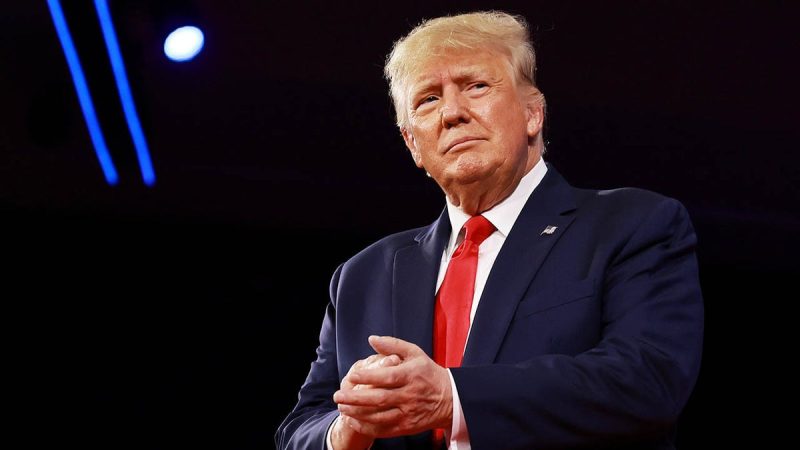FIRST ON FOX – A group of Republican state attorneys general ripped Special Counsel Jack Smith’s request to the Supreme Court to expedite former President Trump’s immunity case as ‘driven by partisan interests, not the public interest.’
Earlier this month, Smith petitioned the high court to decide Trump’s immunity claims in his case facing charges related to his efforts to overturn the 2020 election results.
Smith asked for expedited consideration of the case to essentially have the high court take over jurisdiction before the lower federal courts have fully decided the matter, bypassing an entire appellate process though a special rule – Rule 11 — reserved for emergencies.
But 19 attorneys general filed a brief to the high court Tuesday arguing that Smith’s rationale is politically motivated to keep Trump’s trial ahead of the 2024 election in November.
‘The United States’ petition repeatedly proclaims – but never explains why – ‘[i]t is of imperative public importance that respondent’s claims of immunity be resolved by this Court and that respondent’s trial proceed as promptly as possible if his claim of immunity is rejected,’’ the brief states.
‘That silence is both telling and troubling, suggesting that the United States’ demand for extraordinary and immediate relief is driven by partisan interests, not the public interest,’ it says.
Rule 11 says that a petition to the high court to review a case pending in an appeals court, before judgment is entered in that court, will be granted only upon a showing that the case is of ‘such imperative public importance as to justify deviation from normal appellate practice and to require immediate determination in this Court.’
Alabama Attorney General Steve Marshall, who led the brief for the GOP states, told Fox News Digital in a statement that the special counsel’s petition ‘is strong evidence of a political prosecution designed to decide the 2024 election.’
‘In November of last year, Joe Biden vowed that Donald Trump would never become president again. Then, in August 2023, more than 30 months after the events alleged in the indictment, the federal government indicted Trump and now seeks to rush him to trial in March 2024. But the former President is entitled to appeal the trial court’s order denying him presidential immunity,’ said Marshall.
‘Thus, worried about losing his trial date, the special counsel is asking the U.S. Supreme Court to jump into the fray. But he gives no reason why the public interest demands a rushed trial, which suggests the real reason is to swing the presidential election,’ stated Marshall.
‘The Court should not play along,’ he said.
Smith wants the Supreme Court to answer, ‘whether a former President is absolutely immune from federal prosecution for crimes committed while in office or is constitutionally protected from federal prosecution when he has been impeached but not convicted before the criminal proceedings begin.’
Smith argues that the ‘ordinary process… may not result in a final decision for many months,’ which ‘might prevent this Court from hearing and deciding the case this Term.’
But the AGs maintain that ‘[t]hat’s not an argument. It’s a tautology: If the Court does not ‘review now,’ it cannot ‘review now.’ But why is it imperative to review now?’
The top state prosecutors went on to reference when the high court did allow for expedited proceedings – for example, the Iranian hostage crisis in the ’80s and the steel production crisis during the Korean War.
In contrast with Trump’s case, they said, ‘The government has not shown an urgent need in this case.
‘Is there a war, a hostage negotiation, or a border crisis at issue? No. And the petition cites no authority for its position that some prosecutions must go so quickly that a criminal defendant loses his right to an orderly appeal,’ adding that, ‘the government’s recitation of the trial date is quite meaningless as every prosecution that goes to trial has a trial date.’
‘All criminal defendants have a right to a fair and orderly process. The gravity of this particular prosecution is all the more reason to ensure that right,’ the AGs write.
‘For reasons unknown, the prosecution has sought and secured an expedited trial and an expedited appeal. But this Court’s Rule 11 requires more than a vague government interest in speedy trials. The United States has not shown that its plan to take President Trump to trial on March 4, 2024, ‘is of such imperative public importance as… to require immediate’ intervention by this Court,’ the Republicans said.
The brief was submitted by the states of Alabama, Alaska, Florida, Idaho, Indiana, Iowa, Kentucky, Louisiana, Mississippi, Missouri, Montana, Nebraska, North Dakota, South Carolina, South Dakota, Texas, Utah, West Virginia and Wyoming.
